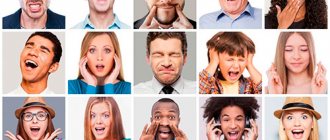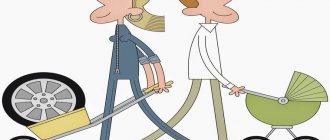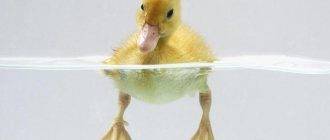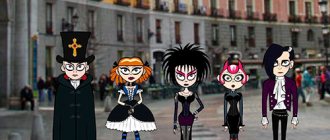Perhaps everyone, at least once, by bending masterfully, avoided falling on the ice or chose the right answer, following the “sixth sense”. We mistakenly say that we acted “instinctively,” but in fact, each of our unconscious decisions is the result of the work of the intellect, or rather, the experience accumulated over many, many years. The human brain is capable of making decisions so quickly that it seems to us that they are the product of evolution that lasted thousands of years, and our body itself “knows” what to do.
People often confuse instincts with desires, automatic actions or reflexes.
Meanwhile, instincts for millions of animals are the only program that ensures survival.
Instinct arises when it is necessary to satisfy a need for something, and preferably with minimal decision-making costs. To do this, the animal needs a genetically (or epigenetically) fixed, clear and fixed set of actions and a certain signal that will trigger it.
Instinct does not always look logical, but a representative of the fauna has no need to know about this.
For example, spiders weave a cocoon from a web to procreate in a strictly defined way: the bottom, then the walls, after which the insect lays eggs and covers them with a lid. If you send such a craftsman to another place when he has already made the base, the spider, following instinct, will resume work from the stage at which it stopped. The death of the offspring (and the eggs will fall out of the cocoon without a bottom almost immediately) does not bother him - the main thing is that he completed what was destined by instinct.
Invertebrates don’t like to think at all - they trust the ready-made program, and it turns out great for them. Bees, without training, build honeycombs so that they can hold as much honey as possible while using less wax. In addition, they instinctively find honey and instinctively transmit this information to their neighbors in the hive.
Their more vertebrate counterparts no longer possess such skills: dogs and cats can instinctively chase a moving object, but only chase, but to grab and eat is no longer instinct, but the result of learning.
Definition
Instinct is a genetically determined pattern of behavior of living beings. It is based on the desire of the individual and the entire species to survive. Each option is designed to protect the animal or person from threats.
Most animals have:
- The instinct of self-preservation . This is an innate reaction of individuals to danger and the desire to protect themselves.
- Instinct for procreation . Animals and people have an innate attraction to the opposite sex, aimed at procreation.
Animal instincts in humans are not only behavioral options of a biological nature, that is, to satisfy the needs necessary for survival, but also to embody personal needs for power, dominance, and communication.
Animal instinct is an unconditioned reflex that forms the basis of animal behavior. For higher animals, in the process of individual development, basic instincts are modified, which makes it possible to achieve more complex behaviors.
How is instinct different from reflex?
There is a misconception that instinct is a reflex. But these are different concepts.
Instinct is a set of behavioral reactions, and reflex is a single, simpler action.
Instinct
How do birds find their way south?
Speaking of birds. Twice a year, migratory birds accomplish something truly grandiose, if not impossible, and it is not only about overcoming vast distances, but also about choosing the direction of migration. They use many sources of information: the position of the sun and stars, some landmarks, and the planet’s magnetic field.
It seems that this is true instinct: having never been to a wintering place, the bird feels the need to fly exactly there. But in fact, young individuals do not immediately understand where they need to go, and only over time they comprehend the all-wise science of navigation. However, how this happens still remains a mystery. In some species, youngsters simply follow their flock, studying the route, while in others, apparently, the ability to choose the right direction is genetic (if you cross birds with different types of migration, the offspring may get lost).
So instinct is instinct, but it still needs to be learned. But the need to migrate clearly manifests itself instinctively: when the length of daylight changes, physiological changes are triggered in the birds’ bodies, which prompt them to prepare for migration, and then to fly.
Types of instincts
Instinct is behavior determined genetically. There are several options, divided into groups.
They are:
- Vital - this concerns food and drink instincts, self-preservation;
- Role-playing - erogenous and sexual instinct;
- Self-development - instincts of play, exploration and others. There are several main types.
Self-preservation and survival
Biological instincts are behaviors that ensure survival.
They are manifested by the need:
- satisfy hunger;
- look for a warm place during cold weather;
- treatment in the presence of a disease;
- the need to hide from the sun in the heat.
These are natural instincts, but people know how to control them.
The instinct of self-preservation arises especially clearly in extreme situations. It is believed that the main instinct is self-preservation, since it does not allow one to behave destructively or take risks. It goes hand in hand with fear. Fear is an instinct that manifests itself even in infants when they worry about losing contact with their mother.
Reproduction, parent
Sexual instinct is one of the strongest, the most basic. Initially, it is perceived as a way to satisfy physiological needs. But at a higher level, it manifests itself as a manifestation of strong feelings between representatives of the opposite sex.
Love is an instinct that is aimed at subsequent procreation. But not all modern people strive for procreation, but this does not apply to intuitive behavior.
Important! It is the instinct to reproduce that allows people and animals to maintain populations. If the chain is broken, it leads to the extinction of the species.
Parental instinct is a set of reactions belonging to the same group. In females, it is manifested by caring for the offspring.
Maternal instinct is a controversial phenomenon, since in some women it does not manifest itself. But in some animal species it also spreads to the offspring of other species. For example, there are cases where a duck raised chickens or a cougar fed kittens.
Hunting
This instinct is a form of behavior in men, which was especially pronounced in primitive times, when it was necessary to obtain food.
Now this is manifested by a love of fishing and hunting, but not everyone has it.
Domination and power
This instinct is behavior caused by the need for leadership and power. People with pronounced dominance lead the crowd, organize and manage.
Every group has a leader, even if it is not obvious.
Nothing suppresses the feeling of freedom more than the herd instinct.
MIKHAIL MIKHAILOVICH MAMCHICH
Social
Human social instincts are a series of behavioral reactions that ensure socialization. First of all, people manifest altruism, expressed in caring for others, kindness, and a desire for peace.
Social instinct is a feature that is not expressed in everyone.
Freedom and independence
This instinct leads to independence. It occurs in infants who do not allow themselves to be fed or swaddled.
With age, a person learns to adapt the desire for freedom to common interests.
Religion
Religious instinct is a person’s desire to believe in a Higher Power. It does not appear in everyone.
Human instincts are a set of feelings and behavioral reactions. People must be able or manage in order to be fully accomplished as individuals.
Reflexes
Reflex is a mechanism for realizing instinct. In essence, instinct is a complex of unconditioned reflexes. A person is given 15 reflexes at birth. They are divided into three groups: oral, motor, grasping. Most of them die off during the first year of a child's life.
Other reflexes – conditioned, acquired as a result of learning – become vitally important. We look around when crossing the road, not because of the instinct of self-preservation, but because we have been taught. We pull our hand away from the hot kettle because we once got burned.
And the mind also comes into play. People understand that it is not advisable to give birth every year. And in general, many people prefer career and personal growth. The social part suppresses instincts.
Of the unconditional instincts, the most influential instinct remains only the “herd” instinct. The human crowd is susceptible to a number of mechanisms, including infection and imitation. A sense of community or herdism can turn a group into a chaotic crowd and deprive a person of individuality.
Examples
In modern people, like thousands of years ago, the instinct of life is reactions that have a behavioral form of expression. They become more pronounced in situations that pose a danger to health and life.
Scientists believe that consciousness is an instinct, therefore, when danger is perceived, mechanisms assigned to self-preservation begin to operate.
If a person understands that he may be in danger, ready-made stimuli act in the subconscious. In people, this manifests itself as a fear of spiders, the dark, and heights.
Instinct is an innate feeling, like self-preservation, that begins to act when life is threatened. Then the person tries to escape at any cost
Such reactions manifest themselves as follows:
- when burned, a person withdraws his hand;
- dresses in the cold;
- if there is not enough air, it goes out into the air;
- If he doesn't know how to swim, he doesn't go into the water.
The need to procreate causes the desire to give birth to a child and raise him.
In people, instinct is a reaction that they can control, but in some it can take on inappropriate forms. For example, maternal instinct turns into overprotection or, conversely, into a careless and irresponsible attitude towards one’s own children.
The first instinct is self-preservation, but the others are no less important for life. Maternal innate instincts manifest themselves in girls in the desire to play with dolls. They are more clearly visible in women expecting a child, when the expectant mother begins to arrange housing.
Instinct is nature, which explains some of the behavioral features of men, which are determined by the fact that the male wants to get a female for procreation, but if the conquest is too easy, the prey quickly becomes boring. Such men become avid bachelors with increased libido.
Positive instincts are social, for example, if a person has expressed altruism, he strives to help others, he can become a doctor, psychologist, or volunteer.
People who actively defend their personal freedom express protests from early childhood and have a pronounced instinct for freedom. They turn into politicians, journalists, public figures.
Natural instinct is the most complex act of innate behavior. It has two main features:
- independent of the internal state of the body;
- the stimulus acts only as a trigger for instinctive behavior and does not oblige the entire act to be carried out.
Attention! Darwin believed that instinct is the unconscious, that this type of behavior is characteristic of a particular species and is fixed hereditarily.
When a person is happy with life
Photo by Meruyert GoNULLu: Pexels
Human instincts, already described by Sigmund Freud as well as in other theories, and the resulting needs, like a computer program, constantly control behavior in the direction of satisfying the need.
If the deficit is corrected, they are no longer behaviorally effective as long as the satisfied state remains. However, if the need deficit cannot be eliminated, this leads in the long term to its chronic form and thus to frustration.
Biological indicators of the corresponding state of instinct and structure of needs are feelings that indicate possible satisfaction, as well as possible deficits. This is expressed in emotions that can range from “I’m on cloud nine” to unrelenting hopelessness, sadness, anger or despondency. Only when all open needs are satisfied and all deficits are balanced at the same time, at such moments - and only then is a person satisfied with life.
Acquired Instincts
Acquired instinct is the habits that each person develops in accordance with his innate inclinations. These are not hereditary traits. Such an instinct is an unconditioned reflex that is activated when a person needs to perform a certain action.
Unconditioned instinct is a reaction aimed at increasing safety and survival in extreme conditions. They can be not only positive, but also negative.
Positive is a mixture of good instincts to increase the survival rate and safety of society. These include decency, friendliness, and conscientiousness.
Negative instinct is in psychology acquired qualities, such as meanness, cynicism, deception. They are formed in groups of people with an increased level of the leading component.
What is this?
A long time ago, in Ancient Greece, thinkers and simply smart men noticed that it is human nature to react and behave in the same way in unsafe conditions. The instincts themselves are in the hemocode, and they consist of reflexes, which in turn are:
- Conditional - that is, those that a person acquired during his life. The simplest example is when you turn on the light as soon as you enter the room. You were not born with this knowledge and habit, but acquired it as you grew older. And now you don’t even notice how your hand reaches for the switch.
- Unconditional, respectively, those that we received at birth. It’s rare that someone doesn’t withdraw their hand after touching a hot frying pan or iron, right? This is an unconditioned reflex.
Instincts can be influenced by religion, law, norms and rules of behavior, education or lack thereof. For example, in a family where parents abuse overprotection, controlling every step of the child, then what kind of independence can we talk about? He won’t really understand in which situations he should be careful, and in which, on the contrary, he should show up.
Such stories most often have two versions of events.
First: a child, growing up, remains to live with his parents, since in order to create a family, you need at least a little independence and the ability to rely on yourself.
Second: he tries in every possible way to escape, becomes uncontrollable and aggressive towards those who care for him. The stories of the second option usually end more successfully.
To make it clearer how instincts can be influenced, let’s first look at what they are.
The theory of psychoanalytic drive in human development
According to Freud, development goes through different phases, which depend on age:
- At the first stage, the so-called oral stage, “It” is the only psychological authority that determines behavior. As mentioned above, the psyche is stimulated by instinct, which must be immediately realized. Primary instincts are in full demand here. The child senses the environment only through the mouth, which is why Freud called the oral phase.
- The anal phase begins at two years of age. The mouth no longer serves as the baby's erogenous zone. Everything related to care gives the baby great pleasure. Dirt is also very pleasing. At this stage, the first conflicts arise, because the parents want to raise the child clean.
This creates a “superego” that exactly represents parental demands as the inner voice of reason. It first manifests itself as an external conflict between parent and child. Then an internal conflict arises, which the Self must regulate.
Photo by Angela Roma: Pexels
- The phallic phase occurs between the ages of four and five years. At this stage of life, admiration for the opposite sex arises. This phase is characterized by the first preliminary stages of fantasies about sexual desire, which may also be repressed by parents. Consequently, the “I” must again become a mediator between the instincts of the “Id” and the demands of the “Superego”. At this stage there is also a transition to a holistic object of pleasure.
- Once children learn that they cannot replace a parent of the opposite sex, they enter the latent phase. This begins at age five and continues until puberty. The play instinct is now directed towards one's own sex. Close friends are usually the same sex as the child. This can reignite instincts during puberty, as the opposite sex again promises new things.
- In the genital phase, libidinal energy is directed towards the opposite sex. This phase begins during puberty and ends in late adulthood.
According to Freud, instincts go through these 5 stages.










